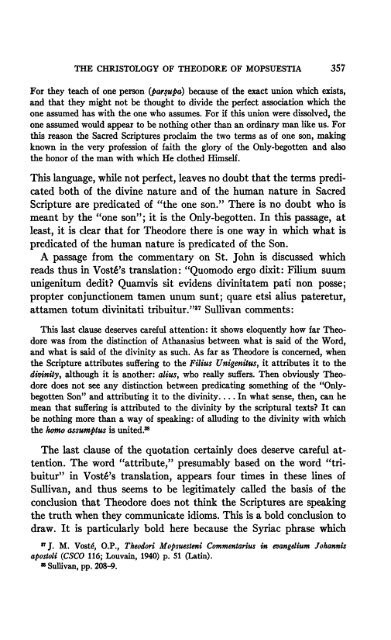ANNOTATIONS ON THE CHRISTOLOGY OF THEODORE OF ...
ANNOTATIONS ON THE CHRISTOLOGY OF THEODORE OF ...
ANNOTATIONS ON THE CHRISTOLOGY OF THEODORE OF ...
You also want an ePaper? Increase the reach of your titles
YUMPU automatically turns print PDFs into web optimized ePapers that Google loves.
<strong>THE</strong> <strong>CHRISTOLOGY</strong> <strong>OF</strong> <strong>THE</strong>ODORE <strong>OF</strong> MOPSUESTIA 357<br />
For they teach of one person (parsupa) because of the exact union which exists,<br />
and that they might not be thought to divide the perfect association which the<br />
one assumed has with the one who assumes. For if this union were dissolved, the<br />
one assumed would appear to be nothing other than an ordinary man like us. For<br />
this reason the Sacred Scriptures proclaim the two terms as of one son, making<br />
known in the very profession of faith the glory of the Only-begotten and also<br />
the honor of the man with which He clothed Himself.<br />
This language, while not perfect, leaves no doubt that the terms predicated<br />
both of the divine nature and of the human nature in Sacred<br />
Scripture are predicated of "the one son." There is no doubt who is<br />
meant by the "one son"; it is the Only-begotten. In this passage, at<br />
least, it is clear that for Theodore there is one way in which what is<br />
predicated of the human nature is predicated of the Son.<br />
A passage from the commentary on St. John is discussed which<br />
reads thus in Vost6 , s translation: "Quomodo ergo dixit: Filium suum<br />
unigenitum dedit? Quamvis sit evidens divinitatem pati non posse;<br />
propter conjunctionem tamen unum sunt; quare etsi alius pateretur,<br />
attamen totum divinitati tribuitur." 37 Sullivan comments:<br />
This last clause deserves careful attention: it shows eloquently how far Theodore<br />
was from the distinction of Athanasius between what is said of the Word,<br />
and what is said of the divinity as such. As far as Theodore is concerned, when<br />
the Scripture attributes suffering to the Filius Unigenttus, it attributes it to the<br />
divinity, although it is another: alius, who really suffers. Then obviously Theodore<br />
does not see any distinction between predicating something of the "Onlybegotten<br />
Son" and attributing it to the divinity In what sense, then, can he<br />
mean that suffering is attributed to the divinity by the scriptural texts? It can<br />
be nothing more than a way of speaking: of alluding to the divinity with which<br />
the homo assumptus is united. 38<br />
The last clause of the quotation certainly does deserve careful attention.<br />
The word "attribute," presumably based on the word "tribuitur"<br />
in Voste's translation, appears four times in these lines of<br />
Sullivan, and thus seems to be legitimately called the basis of the<br />
conclusion that Theodore does not think the Scriptures are speaking<br />
the truth when they communicate idioms. This is a bold conclusion to<br />
draw. It is particularly bold here because the Syriac phrase which<br />
87 J. M. Vost^, O.P., Theodori Mopsuesteni Commentarius in evangelium Johannis<br />
apostoli (CSCO 116; Louvain, 1940) p. 51 (Latin).<br />
88 Sullivan, pp. 208-9.
















